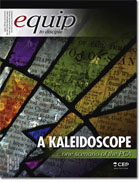
Perhaps I am a little biased on this subject, but I have to admit that each time I hear someone referring to high school students as the “future of the church” a part of me cringes, Don’t get me wrong. I agree with the idea that teenagers must be trained and equipped to one day become the leaders of the church. However, it seems to me that we do a disservice to the next generation if we treat youth ministry as a holding pen for students until they are old enough to do the real work of the church.
Just a few years ago, the Baylor University School of Social Work conducted a study where they found the students with the most mature, vibrant faith that carried on from the teen years to adulthood were those who were actively involved in the ministries of a church as teenagers and those who were engaged in meeting the needs of people in their communities. Given the overwhelmingly negative statistics concerning young adults and church involvement, I am willing to go out on a limb here and suggest that engaging teenagers in the life of your congregation is one of the more important things you can do in your student ministry. Stepping a little further out on the limb, let me also suggest that though the application of the Great Commission must be contextualized, the call to make disciples is equally as valid for the teenagers in your congregation as it is for the adults who inhabit your pews.
I was reminded of these truths again this summer as I had the privilege of directing Youth Excelling in Leadership (YXL), CEP’s denominational student leadership conference, and taking part in our sister conference, YXL Glorieta, held in Glorieta, New Mexico. The goal of both conferences is similar: to develop student leaders through the strong preaching of the Word. dynamic worship experiences, interactive leadership initiatives, leadership assessment, and the expansion of their biblical world and life view. One unique aspect of the YXL conferences is that the local church is asked to identify and recommend high school students that are ready for a week of intense Christian leadership training.
Read entire publication in PDF (Acrobat Reader Required)
This past summer, over 100 students and adults participated in YXL at Covenant College and another 85 took part in YXL Glorieta. In keeping with YXL’s theme of COMMIT, men such as Southern Methodist University RUF Campus Minister Chad Scruggs, Covenant College Chaplain Aaron Messner, and Assistant Pastor of Redemption Fellowship EJ Childs challenged students to explore more fully the commitment that Jesus expects from his disciples. The worship leader, Kirk Ward, Worship Director at New City Fellowship in Saint Louis, added music from around the world to encourage students to think more globally as they worship together. Add to the list a ministry project with Hope for the Inner City (www.hope4.org), paintball, caving in Raccoon Mountain, hiking on Lookout Mountain, and dozens of other leadership activities and YXL 2008 at Covenant College was a life transforming experience for not only the students who attended but for many adults there as well.
At YXL Glorieta, students were encouraged to RISE UP because “the resurrection changes everything.” Under the direction of John Ranheim, Development Director at Covenant Seminary, YXL Glorieta was a huge success. RUF campus pastors Justin Clement and Tom Franklin unpacked from Scripture the resurrection and helped students understand the implications of this event in their lives. Musician Ryan Anderson used his unique music style to draw students into wonderful worship experiences. The natural beauty of Glorieta, New Mexico, coupled with paintball, whitewater rafting, high ropes, and various leadership initiatives help set YXL Glorieta apart as a premier Christian leadership conference for PCA churches in the western United States.
However, it was during the nightly prayer times as I listened to high school students at both conferences crying out, grieving over personal and corporate sin issues, with almost childlike faith asking to be used of God that I realized again that students are more than just the future of the church.
I have been a believer for a little over two decades. For most of that time I have been involved in youth ministry. I am seminary trained and will soon possess the necessary credentials to be a pastor in the PCA, but I don’t know that I can recall many adult prayer meetings where prayers were offered with the sincerity and abandon that I experienced at YXL and YXL Glorieta this summer. let me go as far out on the proverbial limb as Ican this time and make one last suggestion. Perhaps the next time your church has a significant prayer need, you should move your teenagers out of the “future of the church” holding pen and into the ministry of your church by asking them to lead the prayer meeting. Based on my YXL experiences this summer, I have a sneaking suspicion that the adults of your church may be encouraged and challenged at the way the Holy Spirit can use young people to further the kingdom of God.

 In the last Equip Tip, we emphasized the need of the church’s educational ministries to remember and return to the basics. Now, we address what those basics are. The goal of all our ministries is to make kingdom disciples. But what does that mean? A full-grown kingdom disciple would have two main characteristics. He would look, act, and think like Jesus and would be actively helping others become kingdom disciples.
In the last Equip Tip, we emphasized the need of the church’s educational ministries to remember and return to the basics. Now, we address what those basics are. The goal of all our ministries is to make kingdom disciples. But what does that mean? A full-grown kingdom disciple would have two main characteristics. He would look, act, and think like Jesus and would be actively helping others become kingdom disciples.